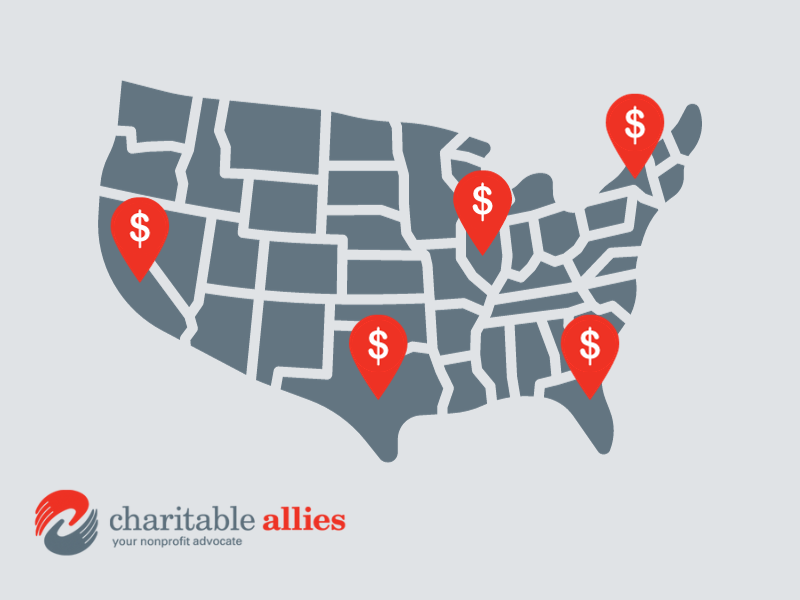
Do you intend to ask for donations through social media, email campaigns, telethons, or snail mail? Are you planning a 5k to raise money for your cause? Want to encourage giving to your nonprofit through a Bingo night or raffle contest? Before your nonprofit does any type of fundraising, in person or digitally, you’ll want to be sure you’re aware of your state’s fundraising regulations. Most states require some type of registration to enable your organization to solicit (ask for) donations legally, which is called Charitable Solicitation Registration.
What is Charitable Solicitation Registration (CSR)?
While the exact process varies widely depending on your state, 43 states do require some sort of registration to be able to fundraise legally. This is called charitable solicitation registration, and most states need this registration before you start fundraising.
If you’re looking to fundraise in multiple states, you’ll have to comply with each of their requirements, not only the state you’re located in. The only states that currently don’t require charitable solicitation registration are Indiana, Idaho, Delaware, Nebraska, South Dakota, Vermont, and Wyoming — and some states, like Arizona, only require certain types of nonprofit organizations to register.
You can look into which government agency handles fundraising in your state and check their website for details on which specific forms and filings you’ll need to fill out. Or, see this useful chart by NASCO to help you get started. It even includes additional notes such as if your state allows filing online and links to the states’ online information about CSR.
Practical Considerations:
Prepare for the costs.
Nonprofits looking to file in states where CSR is required should expect to pay filing fees. Initial CSR filing fees range from anywhere between $10 all the way up to $500. If you’re looking to file in all 50 states, then this cost can really add up. Preparing the forms may also bring up some adjacent costs due to the labor and time spent. If a state requires registration renewals, you’ll also need to be on the lookout for deadlines so you don’t risk paying late fees on top of the filing fees.
See if your nonprofit type is exempt from Charitable Solicitation Registration.
Most states will consider educational institutions and religious congregations exempt from CSR. Membership organizations that only ask for donations from their own members may also be exempt. Again, be mindful that these exceptions will vary by state, so don’t default to an assumption.
Plan ahead with your team.
Brainstorm how your nonprofit will approach CSR compliance. Make a list of the states you’ll want to solicit donations in and check each state’s requirements and deadlines. Since many CSR forms require multiple signatures, give yourselves time to gather them before those deadlines. Make sure to designate who will be responsible for preparing the forms, filings, and/or annual reporting, such as your organization’s accountant, a specialized service provider or your own internal staff.
Check your compliance.
Even if you’ve successfully registered in, say, 10 states, make sure you aren’t accidentally soliciting in states outside of those 10. For example, if you send a newsletter to members in all 50 states and include a donation request inside, you may be illegally fundraising. This might also apply to “donate now” buttons and similar calls to action on your website, depending on your state. 26 states require nonprofits to have a “disclosure statement” which educates potential donors and current supporters about your nonprofit’s standing. Requirements for this disclosure may include the name of your organization, its address and phone number, a description of your mission and programs, and/or whether your gift will be tax deductible. Make sure your nonprofit’s web developers, marketing staff, and even volunteers are aware of these compliance concerns so they can align with the rest of the organization’s messaging in this area.
Dive into the details.
With the help of a charitable solicitation registration expert, cover your bases in special situations such as crowdfunding efforts, game nights, or other more specific scenarios. Most states have laws governing fundraising methods such as using raffles and other forms of gaming and/or gambling, including requirements for certain licenses, even if they don’t require CSR. Again, it is also best practice to make sure someone on your nonprofit’s team “owns” the responsibility to keep track of these licensures and other state level permissions. Keep in mind that even revenue from participation fees (such as event entrance donations) may trigger the need to file CSR.
Consider fiscal sponsorship.
If filing CSR feels daunting, especially if you’re a brand new organization, fiscal sponsorship may be an excellent option for you. Fiscal sponsorship is a formal arrangement where a current 501c3 nonprofit decides to serve as an incubator of sorts for a charitable program created by another group. The 501c3 (the sponsor) provides financial oversight and often some other administrative services which allow for the charitable group (the sponsee) to accept tax-deductible donations. Typically, fiscal sponsorship is most appealing to groups who are in the early stages of getting their nonprofit started and implementing their programs. However, whether or not the sponsee has achieved their own 501c3 status, one of the biggest benefits of this relationship is that the sponsor is the one shouldering the obligation to file CSR. This relieves the sponsee under their wing of the hassle to complete and maintain filings, which is an administrative burden many organizations are happy to forgo for a monthly or annual sponsor fee.
When researching a fiscal sponsor, you’ll want to look at the different sponsorship models offered as well as what types of organizations the sponsor accepts. For example, some fiscal sponsors only assist films, some only incubate church plants, etc. Our sister organization, Fiscal Sponsorship Allies, is a model C fiscal sponsor that accepts a wide variety of charitable programs. They’re registered to fundraise in all 50 states and offer some of the lowest setup fees and administrative rates in the nation. If you’d like to connect with their team, you can apply here if you’re interested. They serve both non-tax-exempt charitable groups and 501c3s so they can solicit donations and grants nationwide.
Final Thoughts on Charitable Solicitation Registration
Without charitable solicitation registration compliance, you leave your nonprofit open to all kinds of liabilities, such as fines, the loss of your nonprofit’s 501c3 status, or damage to your reputation with grantmakers and donors. Ultimately, making sure your nonprofit can fundraise legally is an essential part of carrying out your mission, so be sure to stay on top of your nonprofit’s filings. It’s the little, seemingly inconsequential paperwork that can either make your organization thrive or take a nosedive.
While we don’t assist with filing charitable solicitation registration, let us know if you’d like to have a nonprofit attorney on hand to help with your compliance questions and concerns. We’d be happy to assist so you can focus on what really matters most: your mission.

